Matej Kristan received a Ph.D from the Faculty of Electrical Engineering, University of Ljubljana in 2008. He is a full professor and a vice chair of the department of artificial intelligence at the Faculty of Computer and Information Science, University of Ljubljana. He leads the Visual object tracking VOT initiative, serves as Associate Editor of IJCV and was president of the IAPR Slovenian pattern recognition society (2021-2025). He has co-organized over thirteen workshops and conferences, he received 21 research excellence awards and nine teaching excellence awards. He was the finalist of Mentor of the year in 2020 and 2023 and he received the best paper awards at ISPA2015 and BMVC2022, the 2024-23 best paper award at the Pattern Recognition journal, and Outstanding reviewer award (ICCV2025). His research interests include visual object tracking, few-shot detection, perception methods for autonomous boats, anomaly detection, and machine-learning-based physics prediction models. According to Google scholar, his works have been cited over 15.000 times, his h-index is 46. His Erdos number is 3.
Teaching
- Machine perception(Umetno zaznavanje)
- Multimedia systems (Multimedijski sistemi)
- Advanced computer vision methods: (Napredne metode računalniškega vida)
- In-depth computer vision research: Doctoral study, FRI, UL
Past courses:
- Komunikacije v Avtomatiki, (computer networks) 2009-2012: vaje, dodiplomski študij, FE, UL
- Sistemi Daljinjskega vodenje (wireless sensor networks) 2009-2012: vaje, dodiplomski študij, FE, UL
- Strojni Vid (machine vision) 2010-2018: podiplomski študij, FE, UL
- Večpredstavitveni sistemi (computer vision for multimedia sistems): vaje z letom 2010/2011, dodiplomski študij, FRI, UL
- Računalniško zaznavanje (computer vision): vaje z letom 2010/2011, dodiplomski študij, FRI, UL
- Multimedijski sistemi (computer vision for multimedia systems): vaje z letom 2011/2012, dodiplomski študij, FRI, UL
- Umetno zaznavanje (computer vision): vaje z letom 2011/2012, dodiplomski študij, FRI, UL
- Robotics and machine perception 2012/2013: predavanja(Robotika in računalniško zaznavanje)
Research
My primary research interests include visual object tracking, anomaly detection and segmentation, perception methods for autonomous boats and machine-learning-based geophysics prediction models.
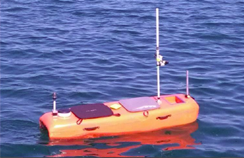
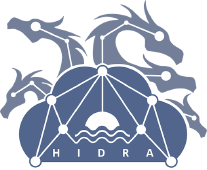
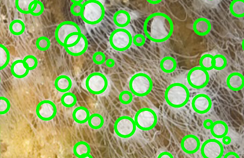
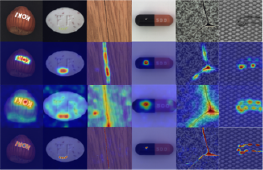
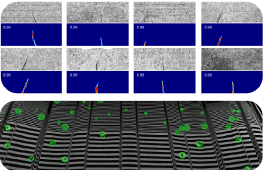
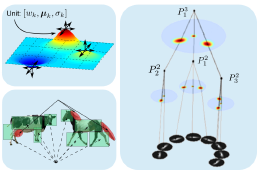
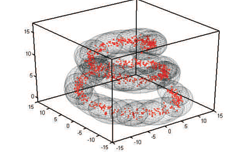
Selected projects
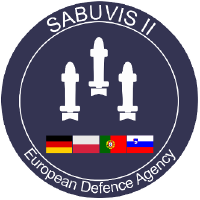
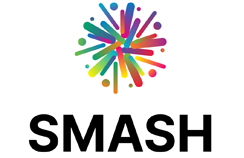
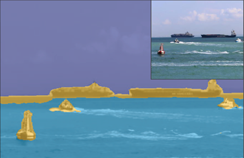
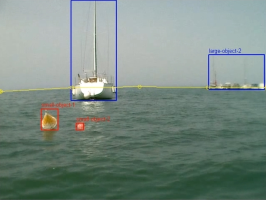

Events & Service to Community
Service to community:
- President of IAPR Slovenian Pattern Recognition Society (2021-2025)
- Associate Editor of IJCV (2021 - )
- Area chair at IEEE/CVF Conference on Computer Vision and Pattern Recognition (CVPR) 2022, 2023, 2024, 2025, 2026
- Vice chair of Department of artificial intelligence FRI-UNILJ
Conferences:
- Organization committe of the 2nd Visual Object Tracking Segmentation Challenge Workshop VOTS2025 in conjunction with the ICCV2025
- Organization committe of the 3rd Workshop on Maritime Computer Vision MaCVi in conjunction with the WACV2025
- Organization committe of the 2nd Visual Object Tracking Segmentation Challenge Workshop VOTS2024 in conjunction with the ECCV2024
- Organization committe of the first Visual Object Tracking Segmentation Challenge Workshop VOTS2023 in conjunction with the ICCV2023
- Organization committe of the 2nd Workshop on Maritime Computer Vision MaCVi in conjunction with the WACV2024
- Organization committe of the tenth Visual Object Tracking Challenge Workshop VOT2022 in conjunction with the ECCV2022
- Organization committe of the 1st Workshop on Maritime Computer Vision MaCVi in conjunction with the WACV2023
- Organization committe of the ninth Visual Object Tracking Challenge Workshop VOT2021 in conjunction with the ICCV2021
- Organization committe of the eighth Visual Object Tracking Challenge Workshop VOT2020 in conjunction with the ECCV2020
- Organization committe of the seventh Visual Object Tracking Challenge Workshop VOT2019 in conjunction with the ICCV2019
- Organization committe of the sixth Visual Object Tracking Challenge Workshop VOT2018 in conjunction with the ECCV2018
- Organization committe of the fifth Visual Object Tracking Challenge Workshop VOT2017 in conjunction with the ICCV2017
- Program chair of the 10th Int’l Symposium on Image and Signal Processing and Analysis, ISPA2017
- Organization committe of the fourth Visual Object Tracking Challenge Workshop VOT2016 in conjunction with the ECCV2016
- Organization committe of the third Visual Object Tracking Challenge Workshop VOT2015 in conjunction with the ICCV2015
- Competition chair at the 11th IEEE International Conference on Automatic Face and Gesture Recognition, FG2015
- Organization committe of the second Visual Object Tracking Challenge Workshop VOT2014 in conjunction with the ECCV2014
- Organization committe of the first Visual Object Tracking Challenge Workshop VOT2013 in conjunction with the ICCV2013
- Organization committe of the Pattern Recognition section at the 22nd International Electrotechnical and Computer Science Conference ERK2013
- Organization committe of the 17th Computer Vision Winter Workshop (CVWW2012)
Awards
- 2025 Outstanding reviewer award at ICCV2025 (~3% among ~1k reviewers).
- 2024 Best paper 2024-23 award at the Pattern Recognition Journal for our work on anomaly detection.
- 2024 Excellent research achievements in 2023 award by the Slovenian Research Agency for our work on few-shot counting ARIS.
- 2024 Award for excellent research achievement at FRI-UL.
- 2024 Professor of the year (masters program) voted by students of FRI-UL.
- 2023 Professor of the year (masters program) voted by students of FRI-UL.
- 2023 Excellent research achievements in 2022 award by the Slovenian Research Agency for our work on anomaly detection.
- 2023 Best paper award at ERK 2023 Pattern recognition section
- 2023 Runner-up for supervisor of the year award organized by Mlada Akademija (Slovenia Universities and Institutes).
- 2022 BMVC2022 best paper award for our work on transparent object tracking
- 2022 Excellent research achievements in 2021 award by the Slovenian Research Agency for our work on segmentation tracking.
- 2022 Research excellence award by University of Ljubljana for our work on segmentation tracking.
- 2021 Professor of the year (masters program) voted by students of FRI-UL.
- 2021 Excellent research achievements in 2020 award by the Slovenian Research Agency (Hidra).
- 2021 Research excellence award by University of Ljubljana for surface defect detection methods (coauthor).
- 2020 Our work on RGB/RGBD long-term tracking and evaluation was selected as one of the Excellent Slovenian research achievements in 2020 by the Slovenian Research Agency.
- 2020 Golden plaque award for outstanding scientific achievements of a research group awarded by University of Ljubljana.
- 2020 Runner-up for supervisor of the year award organized by Mlada Akademija (Slovenia Universities and Institutes).
- 2019 Excellent research achievements in 2019 award for our work on tracking by the Slovenian Research Agency.
- 2018 Golden plaque award for outstanding scientific and pedagogic contributions awarded by University of Ljubljana.
- 2018 Award for excellent pedagogical work, awarded by the Faculty of computer and information science, University of Ljubljana
- 2017 Our work on VOT initiative that was selected as one of 10 exceptional research achievements in 2017 by University of Ljubljana.
- 2015 Best paper award at pattern recognition section at ERK2015 for the paper coauthored with my student Domen Rački.
- 2013 Young University teachers and researchers award for excellent teaching and research achievements, by University of Ljubljana.
- 2013 Exceptional scientific achievements in 2012 award for a coauthored paper, awarded by the Slovenian research agency.
- 2012 Contributed on the research project “A system for interactive learning in dialogue with the tutor”, for which an award for exceptional research achievements in 2011 was attributed by the Slovenian research agency.
- 2010 Award for contributions in popularization of Computer and information science, awarded by the FRI, University of Ljubljana
- 2009 Vodovnik Award for excellent research achievements relating to doctoral thesis, FE, University of Ljubljana.
- 2009 Award for excellent research achievements in the last years, FRI, University of Ljubljana.
- 2009 Innovation award for applied research project (part of project team), by Innovation forum, sponsored by Slovenian business and foreign investment agency.
- 2005 Best paper award at the International Symposium on Image and Signal Processing and Analysis ISPA2005
Awards of students under my supervision:
- 2025 Two Prešeren awards: University Prešeren award University Prešeren award) (Jovana Videnović), and the faculty Prešeren award (Matjaž Zupančič Muc).
- 2025 [Uroš Seljak award] (https://www.uni-lj.si/dogodki/2025-09-24-cetrta-podelitev-nagrad-in-pohval-dr-urosa-seljaka) for best student research paper at UL (Jovana Videnović, DAM4SAM).
- 2025 CVWW 2025 SBME Best Presentation Award for the work on distractor-aware tracking (Jovana Videnović).
- 2024 University Prešern award to Jer Pelhan for his master’s thesis.
- 2024 Uroš Seljak award for best student research paper at UL (Jer Pelhan, DAVE paper).
- 2024 University dr. Ana Mayer Kansky award, Alan Lukežič for his Phd thesis.
- 2023 Outstanding research achievement of PhD students in 2023 award (Lojze Žust) by FRI-UNI-LJ.
- 2023 Three Prešern awards! Nikola Djukic, Žiga Trojer and Matija Teršek each received a Prešeren award from FRI for their master theses.
- 2023 Uroš Seljak commendation (pohvala) for research work (Žiga Trojer) by UNI-LJ
- 2022 Outstanding research achievement of PhD students in 2022 award (Borja Bovcon) by FRI-UNI-LJ.
- 2022 Honorable mention of the research achievements of PhD students in 2022 (Lojze Žust) by the FRI UNI-LJ.
- 2021 University Prešeren award from UNI-LJ, Lojze Žust for his masters thesis.
- 2021 Two outstanding research achievements of PhD students in 2021 award (Lojze Žust and Borja Bovcon) by FRI-UNI-LJ.
- 2021 Vitjan Zavrtanik (co-supervised his research) received an honorable mention of the research achievements of PhD students in 2020, awarded by FRI UNI-LJ (four awards given).
- 2020 Two PhD students, Borja Bovcon (my PhD student), and Vitjan Zavrtanik (co-supervised his research) received an award for outstanding research achievements of PhD students in 2020 (three awards given), awarded by The Faculty of computer and information science (FRI) UNI-LJ.
- 2020 Two PhD students Domen Tabernik (my PhD student)) and Jon Muhovič (co-supervised his research) received an honorable mention of the research achievements of PhD students in 2020, awarded by FRI UNI-LJ (five awards given).
- 2019 Two of my PhD students (Alan Lukežič and Borja Bovcon) received an (award for outstanding research achievements) of PhD students in 2019 (four awards given), awarded by FRI UNI-LJ.
- 2018 Two of my PhD students (Alan Lukežič and Domen Tabernik) received an (award for outstanding research achievements) of PhD students in 2018 (five awards given), by FRI UNI-LJ .
- 2018 Borja Bovcon received an (honorable mention of the research achievements) of PhD students in 2018, by the FRI UNI-LJ.
- 2018 Lojze Žust received (Prešeren award) from FRI UNI-LJ, for his bachelor thesis.
- 2017 Faculty Prešeren award from the FRI UNI-LJ (Borja Bovcon, for his masters thesis).
- 2015 Faculty Prešeren award from the FRI UNI-LJ, (Alan Lukežič, for his masters thesis).
Selected publications
Selected journals:
Selected conferences:
Complete list of my publications is available here .
PhD Students
- Matjaž Zupančič Muc, Area of research: Visual object tracking, (active)
- Jer Pelhan, Area of research: Few-shot detection and counting, (active)
- Marko Rus, Area of research: Deep extreme weather prediction models, (active)
- Lojze Žust, Area of research: Vision for unmanned surface vehicles, (active)
- Borja Bovcon, Area of research: Vision for unmanned surface vehicles, (finished 2022)
- Alan Lukežič, Area of research: Visual object tracking, (finished 2021)
- Domen Tabernik, Area of research: Deep compositional models, (finished 2021)
- Peter Uršič, A Compositional Hierarchical Architecture for Spatial Modelling, (finished 2016)
- Luka Čehovin, A hierarchical adaptive model for robust short-term visual tracking, (finished 2015)
